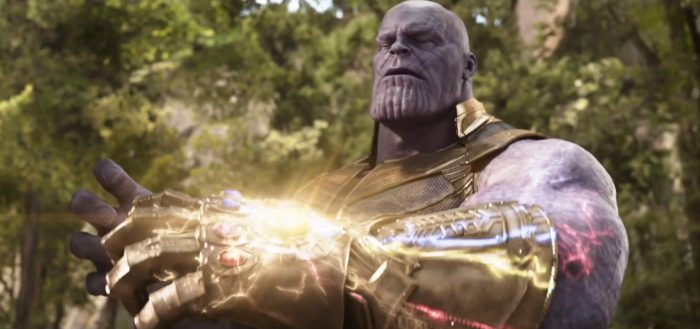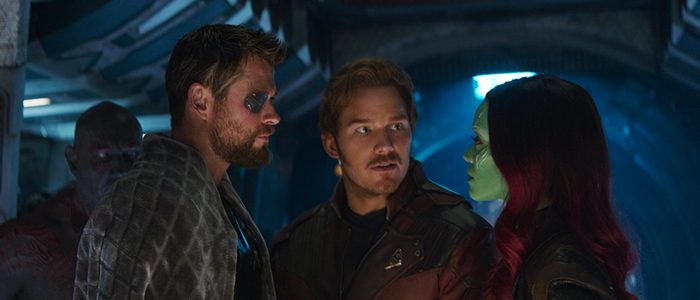
(Welcome to Road to Endgame, where we revisit the first 22 movies of the Marvel Cinematic Universe and ask, “How did we get here?” In Part One of our two-part look at Avengers: Infinity War: how Thanos and the Infinity Stones rewrite our favourite heroes.)
Avengers: Infinity War stormed through the 2018 blockbuster landscape, one-upping the industry-wide shift in tone, scale and narrative priorities Marvel had ushered in over a decade. The film combined eight existing franchises to deliver the first half of a humungous finale; the result was on-screen enormity, matched by an inevitable $2 billion box-office haul. The sequel, Avengers: Endgame, is sure to surpass it.
The Marvel Cinematic Universe has its roots in military propaganda; the U.S. Department of Defense subsidized (and thus, had screenplay approval over) Iron Man, Iron Man 2, Captain America: The Winter Soldier and Captain Marvel. And though Avengers: Infinity War didn’t need to run its script by the Pentagon (as far as we know), it falls back on the series’ paradoxical framing of heroism, as a result of its military-funded predecessors. However, this unprecedented crossover event could not have succeeded, or even existed, without a decade of narrative investment. The film takes full advantage of this — albeit to mixed results.
For better or worse, Avengers: Infinity War is a culmination of everything the Marvel Cinematic Universe stands for.

Character Un-Development
Avengers: Infinity War occupies a unique space in the Marvel landscape, given its villain Thanos (Josh Brolin), the Mad Titan. Thanos is not the film’s protagonist, mind you; this marketing angle is as false as Ant-Man and The Wasp being a romantic comedy or Captain America: The Winter Soldier being a ’70s conspiracy thriller. However, Thanos’ key function is to impede (and in some cases, undo) the decade-long arcs and storylines of the film’s actual protagonists: the Avengers, Black Panther, Doctor Strange, Spider-Man and the Guardians of the Galaxy. Where narrative stakes are concerned, that’s a commendable risk.
The six Infinity Stones, which have been showing up ever since Captain America: The First Avenger in 2011, help facilitate this function. With near-limitless control over Mind, Soul, Space, Time, Power and Reality — combined, they help Thanos wipe out half the universe — these all-powerful MacGuffins function as metatextual rewrites, as if Thanos’ Infinity Gauntlet were reaching into the series from some external realm and undoing its very fabric.
Take, for instance, the climactic moment where Wanda Maximoff (Elizabeth Olsen) is forced to kill her lover The Vision (Paul Bettany), whose consciousness resides in the Mind Stone. The couple wrestles with how to control, protect or destroy this power throughout the film, ultimately choosing sacrifice in order to save the universe. And yet Thanos, having just acquired the Time Stone (a time-travel device introduced in Doctor Strange), simply undoes their decision with a flick of his wrist. However, he leaves its harrowing emotional crater intact; Wanda still remembers the pain of killing The Vision, who Thanos then proceeds to murder anyway before taking the Mind Stone.
In Avengers: Infinity War, the heroes’ sacrifices are for naught, and steps forward for the characters are each cancelled out by intentional steps back.
The series has thus far relied on superhero Trolley Problems, each growing in complexity and personal proximity to the heroes. In their debut films, Thor, Captain America, Doctor Strange and the Guardians of the Galaxy chose to sacrifice themselves to save civilians. In The Avengers, Iron Man nearly died while stopping the World Council from killing millions to prevent global invasion. The heroes in Captain America: The Winter Soldier were faced with a similar problem — H.Y.D.R.A., the villains, sought to kill millions to bring about world peace — and in Avengers: Age of Ultron, the Avengers were challenged with a dilemma where failure meant global extinction, but success meant killing an entire city.
And while the Avengers had a convenient way out of Ultron’s plan (the re-emergence of S.H.I.E.L.D.), they’re given no such luxury in Avengers: Infinity War, wherein Thanos’ Trolley Problem lays half the universe on one track, and the Avengers’ loved ones on the other. In the comics, Thanos kills half of all life to impress the personification of Death. In the films, he’s driven by a maniacal, un-feeling utilitarianism; the logical outcome of an MCU where humanist heroes refuse to compromise — until they must.

Thor, God of Nothing
The undoing of developments in prior films begins in the very first scene. The Asgardian refugees — whom Thor (Chris Hemsworth) had saved by destroying his own kingdom in Thor: Ragnarok — are attacked, as is the fate of many refugee ship in the real world. Fun as the film may be in parts, it’s not a bright and happy story.
The massacre of his brother Loki (Tom Hiddleston), his friend Heimdall (Idris Elba) and half the remaining Asgardians sends Thor tumbling toward regress. His eye-patch was no doubt a cool new look, and one that aligned him with his father’s mythical wisdom, but replacing it with a mechanical eye serves a dual purpose. It marks Thor as a victim of Thanos — Gamora (Zoe Saldana), Nebula (Karen Gillan) and Thanos’ other children have similar robotic distinctions — and it represents a return to the reckless, pre-Ragnarok Thor, as does acquiring a new hammer.
Thor had spent his last five appearances outgrowing his arrogant, vengeful warmongering. Here, he’s forced to return to that juvenile state. By the end of the film, he’s so hellbent on not just killing Thanos, but looking him in the eye and making him suffer — a revenge mission, rather than an act of universe-saving altruism — that the few seconds between wounding Thanos and potentially killing him are enough to turn the tide.
Rather than doing the deed, Thor stops to gloat, and taunts the Mad Titan. During this interval, Thanos snaps his fingers and wipes out half the universe. Thor’s moment of catharsis leads to catastrophe.

Guardians of No One
Star-Lord/Peter Quill (Chris Pratt) is forced back into a similar state of arrested development. His first film appearance, Guardians of the Galaxy, was about him learning to accept the pain of grief, and it tied his mother’s passing — the rejection of which locked him in perpetual adolescence — to Gamora’s love. The Power Stone even conjured his mother’s image as he reached out to Gamora, accepting love in the same moment he accepted death. “Take my hand,” both women said.
In Avengers: Infinity War, Quill’s series-long arc culminates when Gamora asks him to kill her, in the hopes of preventing Thanos from finding the Soul Stone. She even makes him swear on his mother to do so. Quill is forced to let go of the love he’s been given — not long after losing his father Yondu in Guardians of the Galaxy Vol. 2 — in order to achieve Marvel’s brand of heroism: saving people through personal sacrifice.
As Quill aims his weapon at Gamora, he cycles through the anger, denial, bargaining and grief of the action he must commit. And just as he begins to accept his mission, Thanos pulls out the rug from under him, using the Reality Stone to turn his gun into bubbles.
Quill isn’t allowed to mourn. Later in the film, when he discovers Thanos has killed Gamora (while the Avengers attempt to steal the Gauntlet), Quill’s return to reckless anger makes him lash out at Thanos and derail the mission. This arc makes for a great narrative catalyst, at least on paper. Though while Quill’s emotional bookends work in isolation — accepting Gamora’s death, and later failing to do so — the time between these moments fails to dramatize Quill’s emotional journey. In the interim, he’s back to making jokes and arrogant quips.
In contrast, Thor’s grief is a focal point whenever he’s on screen. It’s why his arrival in Wakanda feels so viscerally rousing; he earns his place in the battle, and his opportunity at revenge. Quill’s screw-up, however, doesn’t feel tethered to the emotions driving him. He acts recklessly on Titan, but his narrative until then never externalizes the source of his regress: a deep-seated pain, as he’s prevented from accepting death once more (Dramatic stakes becoming apparent only in-the-moment is one of the film’s most common problems).
Gamora, too, is forced into a premature culmination; her story is essentially over when she believes she’s killed Thanos. She’s forced to reckon with the pain of having murdered her own father, but this turns out to be another Reality Stone ruse. Even when Gamora tries to kill herself to prevent Thanos from acquiring the Soul Stone, the Mad Titan doesn’t permit her this sacrifice. He replaces her knife with bubbles as well, and takes her life instead.
This thematic through-line — sacrifice, what it means, and who gets to do it — is best embodied by Captain America (Chris Evans), whose brief presence speaks volumes about the series thus far. Though, the idea of sacrifice is also contorted and corrupted by the Mad Titan, making him the Avengers’ twisted reflection.
Continue Reading Road to Endgame >>
The post Road to Endgame: ‘Avengers: Infinity War’ is a Gargantuan Unravelling of Marvel’s Strengths and Flaws appeared first on /Film.
from /Film http://bit.ly/2VRbXtL


0 Comments